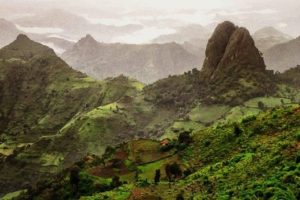
The story of coffee is never ending one. Different facets of this magical bean are revealed now and then. Only recently, there were new stories appearing on Google regarding the various aspects of Ethiopian coffee. One of them is about Ethiopian coffee ceremonies as a fascinating and unique culture that celebrates the three different steps in the coffee-making process, particularly coffee prepared at home. Another article deals with Ethiopian coffee buying and brewing tips, saying that Ethiopia is the birthplace of Arabica coffee and the revered origin of the bean.
Still another piece deals with a new coffee brew “for runners who love their caffeine fix” which is an interesting story about an athlete’s experience with Ethiopian coffee that boosted his performance during marathon competitions. He is also the author of the article, in which he records his experience as follows: “Many articles have been penned, books written delving into the secrets behind Ethiopian dominance in distance running, well let me tell you, all that quasi-mystical talk about lifestyle and something in the air at altitude—it’s all wrong. I know the secret: it’s the coffee.”
The author went on to say that, had he known the performance-enhancing qualities of Ethiopian coffee, he would have drank it before starting his journey and set a world record a long time ago. That is absolutely amazing and new as a statement from an athlete who adores Ethiopian coffee. By the way, the athlete is now in the business of promoting and distributing Haile Coffee. That comes straight from his coffee plantation and is exported around the world.
There is a quotation written on a sign hanging from one of the walls of arguably the best and oldest coffee shop in Addis Ababa called Tomoca on Churchill Road. The sign is extolling the virtues or benefits of drinking coffee by quoting a famous French classical writer who said that new ideas came to him in floods after drinking coffee. I don’t remember exactly the words of that quotation, but it comes to my mind every time I think of coffee houses or write something new regarding Ethiopian coffee. Another article in Neuroscience.com news says that there is a chemical component that prevents cognitive decline in old age.
The story of Ethiopian coffee goes on and on, going right into the various sources of the magic bean that may be shrouded in the legendary story of a shepherd named Kaldi. The shepherd is said to have observed one lucky day, just by chance, his goats unusually jumping up and down in the field after eating the coffee shrubs that were hitherto unknown. The shepherd apparently took home the beans that were roasted, brewed and drunk by the unsuspicious members of the village community, who could quickly feel the mood-boosting quality of the beans and fell into the habit of drinking it regularly.
Like all legends, the story of coffee may also sound nebulous. However, subsequent studies have established that coffee beans were taken as far as Yemen across the Red Sea, where they were adopted as regular beverages in the form of coffee. Whatever the case might be, the story of coffee has started as a legend and that has now changed into the most moving and still unfolding subject of fascination and realistic narratives.
Ethiopian folk tradition maintains that the word coffee has borrowed its name from a region in Ethiopia called Kaffa, where the beans were first discovered. This assertion, too, may be the subject of research into its etymology as the study of the origin and history of the word. Then, it has slowly conquered the entire world thanks to its flavor, aroma and other qualities not found even in countries like Brazil that are considered the biggest producers of the beans. Ethiopian coffee is great, not because of the number of bags that the country exports every year.
Ethiopia does not produce only one brand of coffee. There are at least seven or eight major types of coffee beans that are produced in Ethiopia but the best among them are Yirgacheffe and Sidamo coffee varieties that enjoy the biggest demand across the global coffee consuming communities as well as elite market from America to China and Europe.
Coffee has become not only the world’s most famous beverage but is serving as the biggest foreign currency earner that supports the national economy for a long time now.
Meanwhile, coffee has made the long journey from compete anonymity to global fame. However, the journey was not fast or easy. At one time, not far off, coffee was considered an unhealthy habit that was allegedly responsible for stomach aches, high blood pressure, tooth decay, mental disorders like hysteria—you name it. Fortunately, advances in the medical sciences and new researches have totally debunked such misconceptions born of either ignorance or misinformation. Even then, coffee lovers continued to enjoy their beverage and nothing bad happened to them. And as scientific knowledge around coffee and coffee drinking advanced, hitherto hidden or ignored health benefits of drinking coffee started to emerge.
Ethiopia is the seventh biggest coffee producer in the world and the first in Africa. As a longtime observer of the coffee market, and as a consumer of the magical mythical, and mysterious beans, I would consider Ethiopian coffee Arabica the best type, the most delicious and the most preferred coffee crop in the world. Quantity might be the determining factor in some cases other than coffee. However, in this world of ever changing choices and alternatives, quality should assume the upper hand over quantity in evaluating such delicious and healing beverages as coffee.
By the way, most coffee drinkers in Ethiopia or anywhere else in the world may not be addicts in the traditional sense of the term, although there may also be addicts in the way some people are food addicts who eat for the sake of eating. There is apparently nothing wrong with being a coffee addict because it is not like drug addiction, which is unhealthy and even devastating. You can quit drinking coffee any time you want and this shows that it would be better to speak of coffee love instead of coffee addiction.
Many people are coffee lovers and they do not love coffee for its own sake, but because it gives them a healthy dose of pleasure, relaxation if not energy. These people are certainly coffee lovers in the broadest sense of the term. Some of the best lovers of coffee think of it as soon as they open their eyes in the morning and close them in the evening without counting the mid-day, post-nap serving of a cup of mood-elevating, inspiration-triggering and morale-boosting cup of coffee that turbo-charges their afternoons.
Some people tell you that the words of the sign hanging from the walls of Tomoca coffee joint are true. That must certainly be a remedy for many writers who spend long hours sitting in front of their laptops and praying for a trickle if not an avalanche of creative ideas or words, and staring at the blank screens. One may not be sure about the potential of coffee as a remedy against writer’s block. Yet, it may certainly be used as a fuel for moving the creative machine forward once the engine is started.
Although they may not know where exactly the avalanche of new ideas may be coming from, it is worth trying it during the dry periods of their creative lives or by sipping the afternoon post-nap cups of coffee that melt in their mouths and rush up to their frontal cortex, stimulating the myriads of brain nerves on its way to reach the centre where words are processed, and ideas take shape.
What is sometimes disturbing is the way the world is always fascinated about coffee while we, the originators, indifferently look on as the stories of coffee are unfolding. Kaldi’s story by itself could be the subject of a book or books. It could also be turned into educational materials for children to show them how keen observation of nature or the environment added with the right kind of curiosity can lead to many discoveries in many areas of endeavors. How about writing ‘coffee books’ that can be displayed at the best hotels in Addis about Ethiopian coffee that could stimulate the thirst of tourists but that of investors too? Not a bad idea eh?
BY MULUGETA GUDETA
THE ETHIOPIAN HERALD FRIDAY 13 OCTOBER 2023





